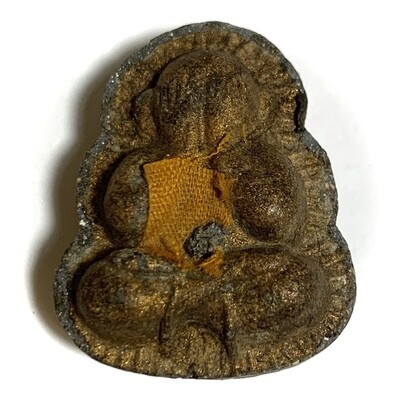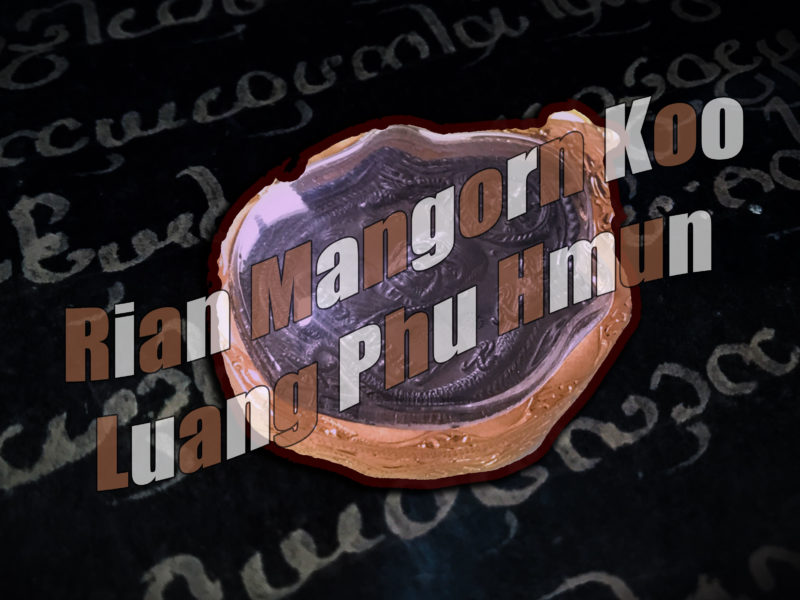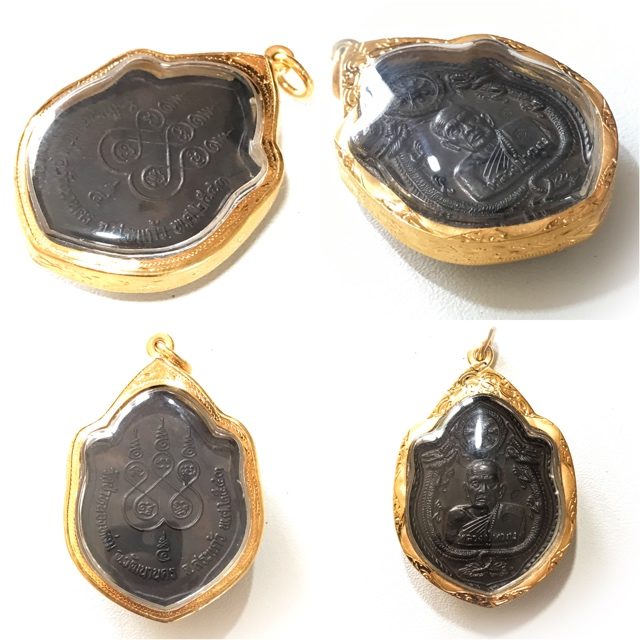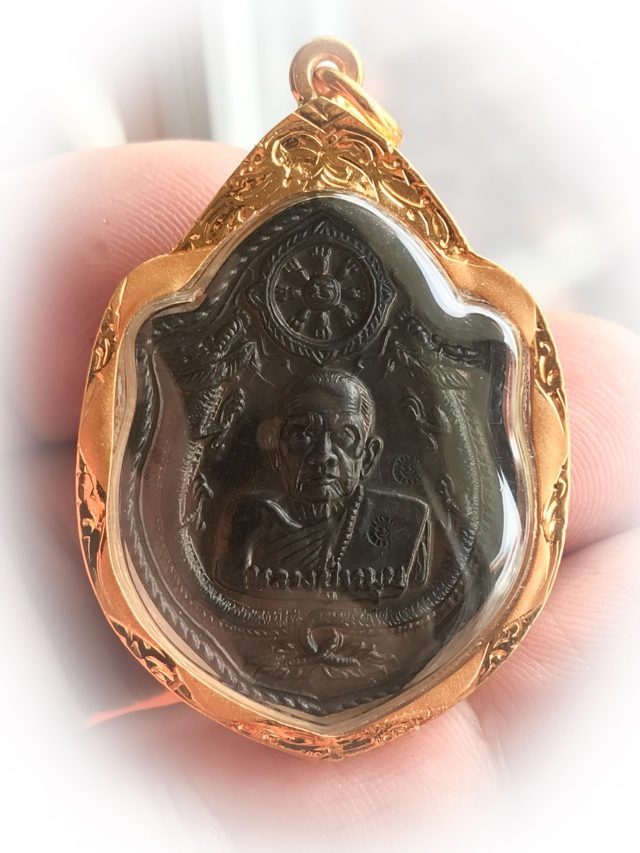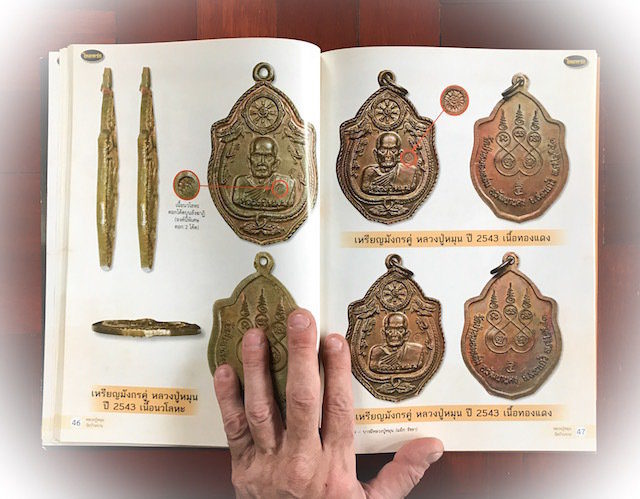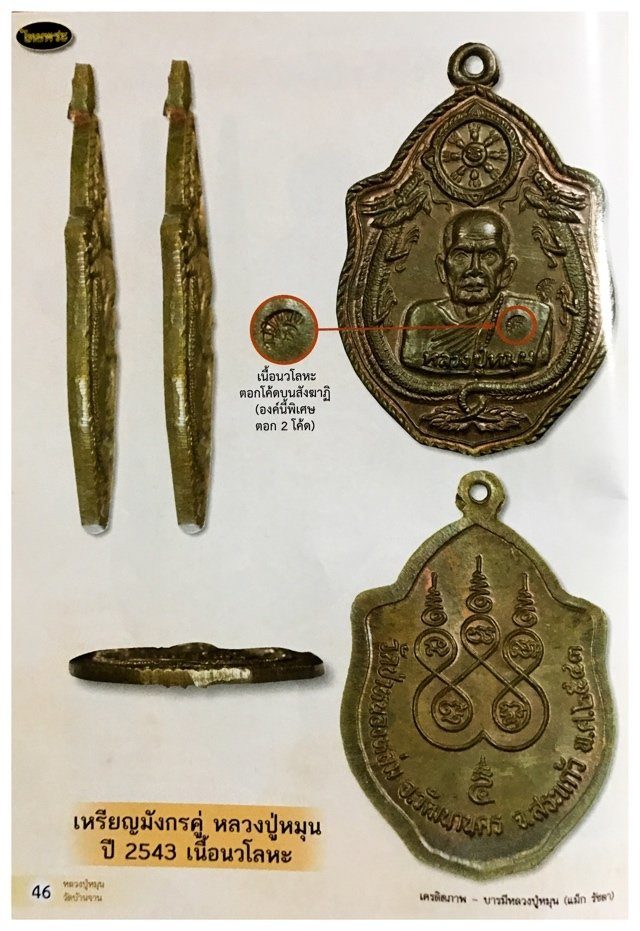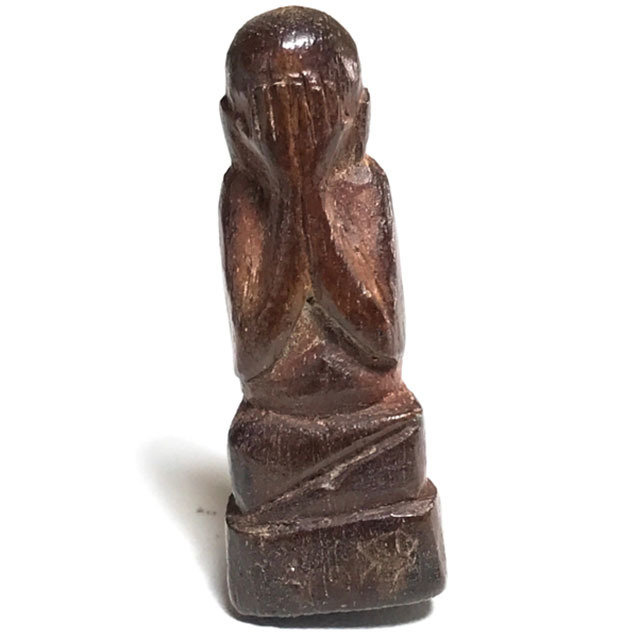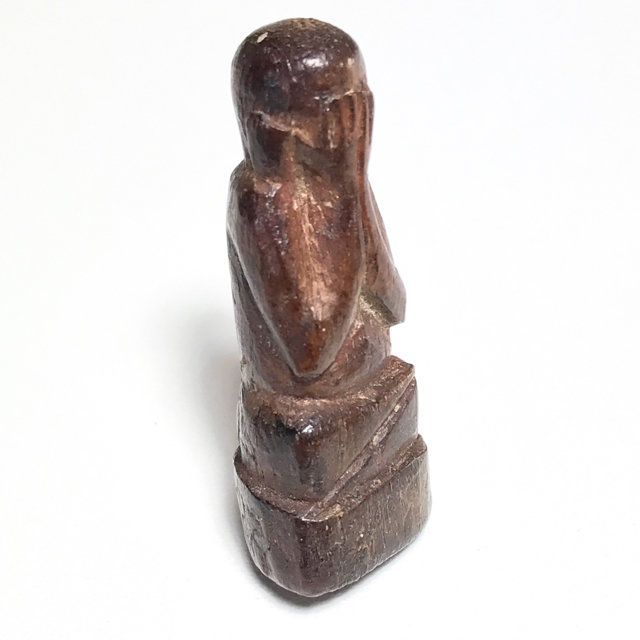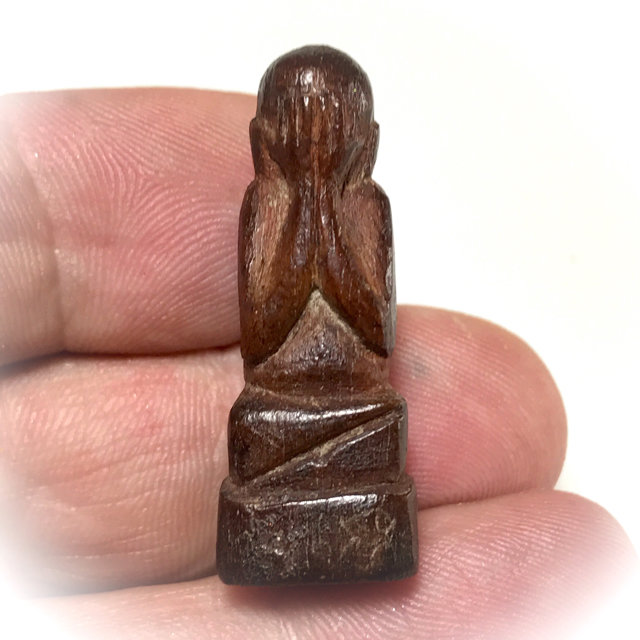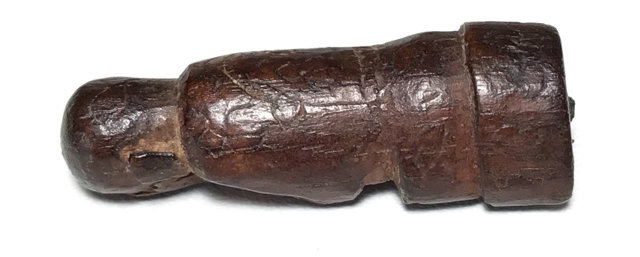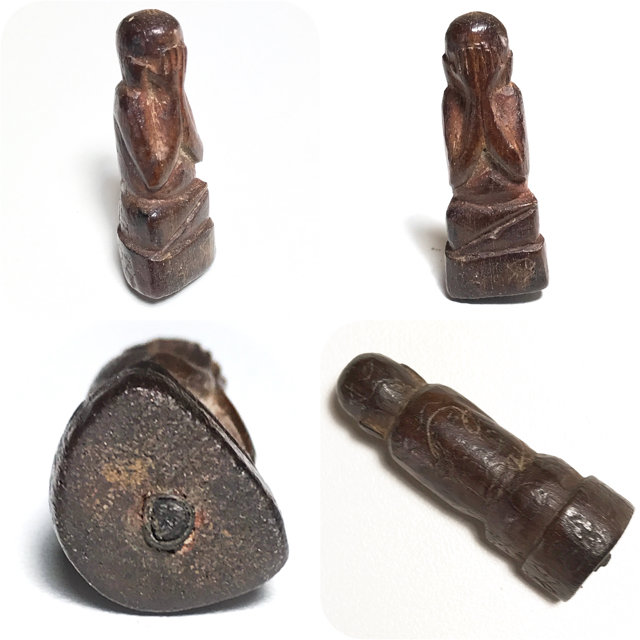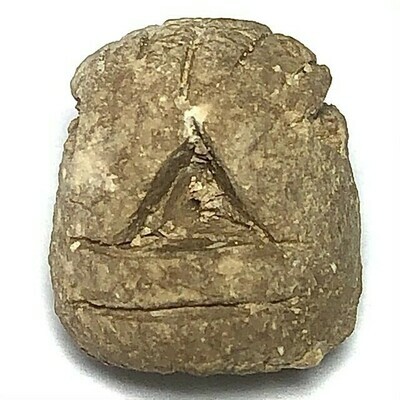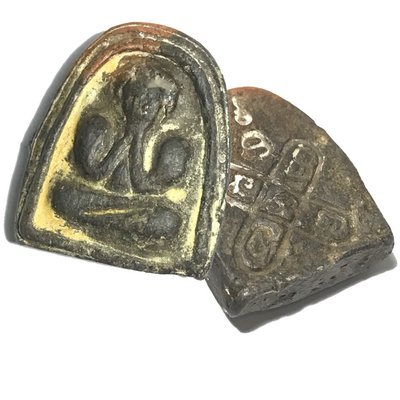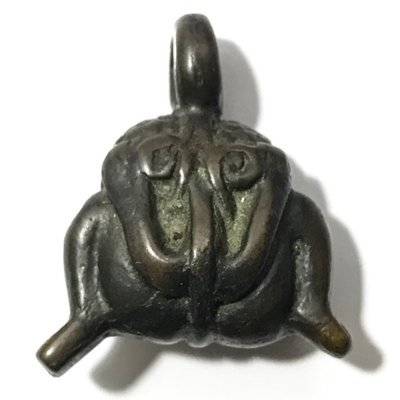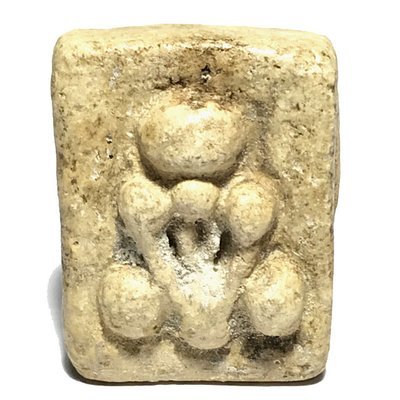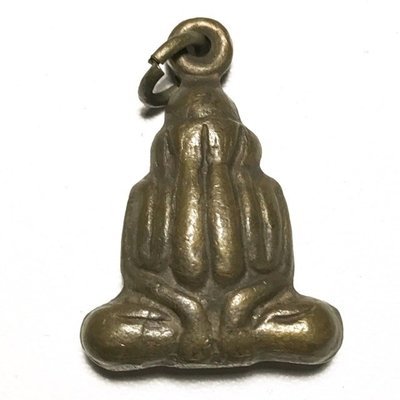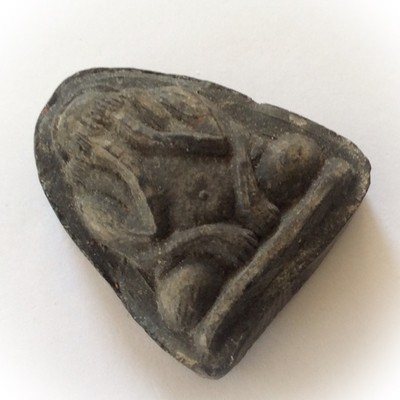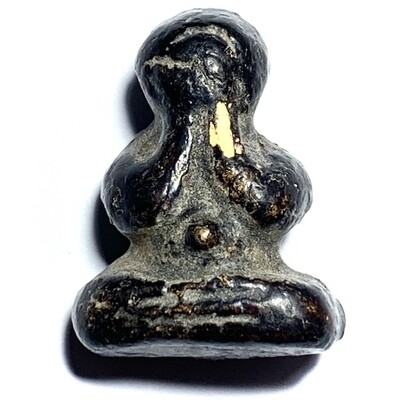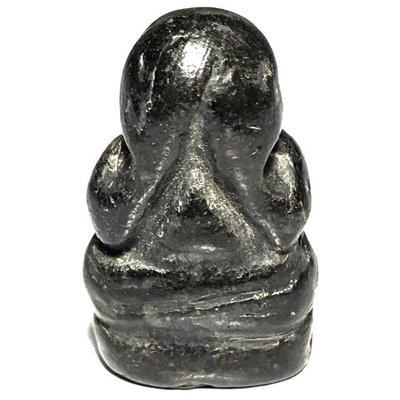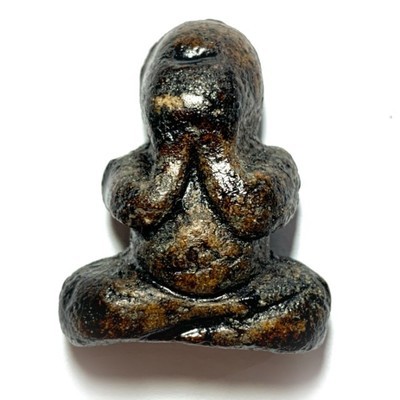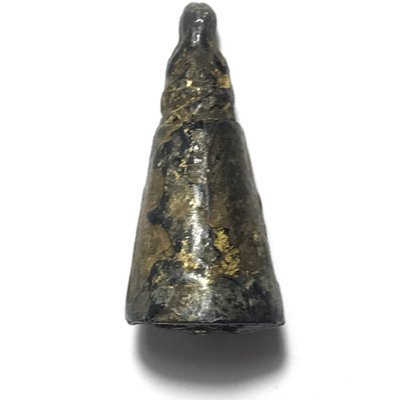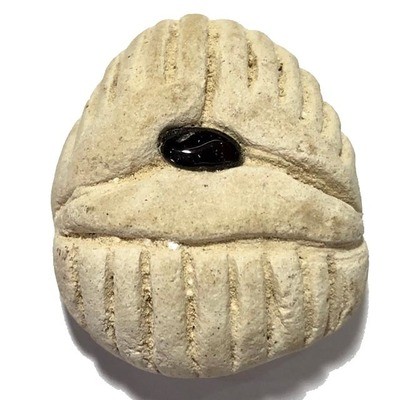A pristinely kept and extremely rare Rian Mangorn Koo Nuea Nava Loha Pim Pised Dtok Sorng Code Ma Wat Pha Nong Lom Run Sao Ha Maha Sethee 5th Lunar Saturday Blessing Ceremony Edition Guru Monk Coin, released in 2543 BE, to raise funds for the Kuti Songk Monks Huts and improve the facilities at the temple of Wat Pha Nong Lom.
This model of Rian Mangorn Koo twin dragons Monk Coin is a very rare Pim Pised (Niyom preferred) and differs from the majority of Rian Mangorn Koo Wat Pha Nong Lom Edition coins in Nava Loha, because of the double code MA stamp. Most coins of the Nava Loha series made for Wat Pha Nong Lom have only a single code Ma Stamp (on the Sangkati chest sash of the robe of Luang Phu), and only the Pim Pised special models received double code stamps. Only very few (unknown number) were distributed with double code stamp, making this not only a sacred, powerful master class amulet, but also a rare collectors piece.
The Rian Mangorn Koo of Luang Phu Hmun is, as are all of his amulets, known for the power of Jaroen Lap Wealth Increasement, and Lucky Fortunes, as well as for their Miraculous Protective Powers. Those born in the year of the dragon love to Bucha this amulet especially, for the obvious reason of the double dragon guardians.
For those with lower budgets, who seek power above collectability and rarity, we recommend to seek the Rian Mangorn Nuea Tong Daeng or Nava Loha single Code Ma, of the same edition, which carries a lower price than this special Nava Loha Pim Pised Gammagarn double code collectors edition model.
Pra Pid Ta Nuea Mai Payung Gae Siamese Rosewood Buddha Takrut in Base Luang Phu Rod Wat Bang Nam Won
Presenting a classic pristine example of a World Class top Pra Niyom Master C;ass amulet, the Pra Pid Ta Gae Mai Payung carved sacred Siamese Rosewood Buddha image, with hand inscriptions and Takrut in the base of the amulet, from the Great Master of carved Pid Ta amulets of Olden Days; Luang Phu Rod, of Wat Ban Nam Won in Samut Sakorn.
In the present day it is very difficult to find Siamese Rosewood and is a protected species of tree, so one can in truth only find amulets of this type which were made in olden days, before the prohibition. Mai Payung is considered to be a sacred tree with inhabiting Deva spirit with powerful magic.
The statuette measures 1.5 Inches High (3.5 Cm) and is carved from one of the rarest powerful Sacred treewoods.
Luang Phu Rod is still considered the number one Geji Ajarn of Samut Sakorn masters of all time for Pra Pid Ta amulets. The Province of Samut Sakorn has produced some of the Great Kroo Ba Ajarn Master Monks of our lifetime, including the great Luang Por Rung (Wat Ta Graber), the great Olden Days Guru Luang Por Heng of Wat Ban Khom (famous for carved ivory tigers), but one name stands above others for this Province, when it comes to the Pra Pid Ta carved amulet, the Great Luang Phu Rod Puttasando, of Wat Bang Nam Won, so famous for his Pra Pid Ta and Roop Muean.
The Luang Phu Rod cannot be imitted when speaking of the Great Samut Sakorn Masters, being one of the greatest Masters of that Province in History. Luang Phu Rod Puttasando was born in the year 2416 BE, and lived 72 Years, passing away in the year 2488 BE. Luang Phu Rod was a Monk who was known to have had powerful Wicha to make amulets, and was believed to have possessed the Abhinya Supernatural Powers.
These days, his amulets are extremely rare, and fetch very high prices in the auction rooms of Master Class amulets. His Pra Niyom Preferred Master Class models are many, the most famous and expensive being the Rian Roop Lor Sae Yid 2477 BE, which fetches prices from thousands to tens of thousands of dollars (depending on the condition).
Below, the rear side of the Pra Pid Ta has hand inscriptions of the Sacred Na Metta and other Khom Agkhara on the surface
The Rian Lor Boran in Pim Yerd and Pim Dter models of 2477, which is so highly defined for its metallurgy of Samrit bronze with Ancient gold and silver, artifacts and Yantra foils, and is considered by aficionados a most beautiful coin for visual appreciation under the eye loupe, His Rian Sae Yid See Liam 4 sided coin of 2477 BE, and the Rian Lor Pim Sam Liam Yok Mer Diaw (one hand lifted), and 'Panom Mer' (hands praying) triangular amulet, and not to forget the Rian Lor Pim Jaek Mae Krua, and the Rian Bpam Sema Albaca coin.
Apart from his coin amulets, his many Krueang Rang Talismanic charms, such as his inimitably carved Pra Pid Ta amulets, Singha Lions, Choo Chok, Pha Yant, Takrut, and his famous Phaen Yant Hua Sao Pillarhead Yantra. His Phaen Yant Prateep Singh, and his Magic Rings are also highly sought after and regarded, but are very difficult to find and collect.
Luang Phu Rod's rarest amulet is said to be the Rian Sae Yid Pim Rian Job, which is a slightly differenly filed down version to the standard Sae Yid coin. It is said that Luang Phu Rod only gave the Rian Job to his closest Devotees and Apprentices, and is hence the most difficult amulet to find a photograph of, much less an actual example to study.
Luang Phu Rod was always lovingly called 'Taep Jao Waja Saksit' meaning 'The Angel with sacred Speech'. Most famous for Mastery of Metta Mahaniyom and Kong Grapan Chadtri Klaew Klaad Magic, and was Highly Famed for his Wicha Pha Yant Bang Prai, Wicha Tam Tong Gan Fon Rainstopper Flag Spell, Wicha Takrut, and Wicha Kong Grapan Chadtri.
His amulets have spawned many hundreds of tales of miraculous lifesaving events and lucky fortunes over the last half century, which is part of what has placed this Master at the Pinnacle of his Genre of Amulets. It is said that he who wears the amulets of Luang Phu Rod will instil fear into the hearts of ill wishers and enemies, and will be safe from their ill intentions.
Luang Phu Rod ordained in 2428 BE as Samanera at the age of 12, and immediately began to learn Wicha with Pra Atigarn Luang Por Kae, until he reached the age of 20 years old and was ordained again in 2436 BE as a fully fledged Bhikkhu in the Buddha Sasana. He was given the Monks Surnam (Chāyā) of Puttasando. Once more Luang Por Kae was his Upachaya ordaining officer.
He was already proficient in Wicha from his 8 years as a Samanera Novice diligently practicing, and began his long trajectory as an already well trained Sorceror-Monk, from his previous 8 years of Wicha practice under Pra Atigarn Kae.
Idiosyncrasies
There are some special indiosyncrasies for which Luang Phu Rod was famous, such as his refusal to perform disrobal ceremonies on monks who had ordained with him, and would send them to another Upachaya to disrobe. This was because when Luang Phu Rod would agree to ordain somebody as a monk, they had to promise never to disrobe again. Luang Phu Rod had very strange eyes, with irises which looked like Chakra Disks, and which reflected the light like cats-eyes on the road at night. Nobody ever really dared to look Luang Phu Rod in the eyes when speaking.
If a house had a balcony overlapping the entrance to a house, he would not enter that house if he had to walk under the balcony. He would insist on putting a ladder up to the window, and enter that way instead. This is of course because of certain rules of the Kroo Ba Ajarn of Saiyasart (Rules of Sorcery)
Miracles
The stories of miraculous events with the amulets of Luang Phu Rod, and of Luang Phu Rod himself performing miracles, are numerous. some of the more well documented are;
Once during the Ngaan Prajam Pi yearly Wai Kroo Ceremony, the sky clouded over with dark clouds and was about to let loose with a torrential rainstorm, and Luang Phu Rod came out and made a Pha Yant Tong Fang Takrut (Triangular Yantra Flag with Scroll Spell inserted) and Enchanted it with Incantations. he then instructed his assistants to raise the flag up to the top of the flagpole of the temple. As the yantra Flag reached the top of the flagpole, the massive dark clouds in the sky broke apart and dissipated, leaving a clear blue sky in its place.
Waja Saksit (Wajasit = Power to change things with Speech; Spellcasting) - Once a large group of country folk came to pay devotion at the temple, and were sleeping in the tenmple grounds, as a swarm of mosquitos came and were biting everybody to the point where nobody could sleep or relax. Luang Phu Rod heard of this, and came to tell the devotees to go and sleep inside the Uposatha Shrineroom building.
The devotees entered the Shrineroom, and not a single mosquito entered the whole night, and not a single devotee was bothered further. The Shrinerooms are not hermetically sealed and are as easy for mosquitos to enter as any other part of a temple, which makes this event unexplainable, except for the miraculous Waja Saksit of Luang Phu Rod, and the Sacred Power of the Buddhist Shrineroom.
Singh Glaay Bpen Suea - Lion becomes a Tiger to Scare Away Robbers from the Kuti Hut of Luang Phu Rod. One day a thief came to break into the Kuti of Luang Phu Rod, but as he was about to enter, one of the stone Singha Lion Guardians of the temple in front of the Kuti turned into a Tiger, and walked up and down in front of Luang Phu Rod's staircase, and the thief ran away in terror, to recount the tale to the villagers later, which brought the story back to the temple.
During the final part of his life, Luang Phu allowed the faith filled devotees of Wat Bang Nam Won to reside at the temple when they wished to practice, and set up a daily rule of Dhamma Patipata, for lay people to always practice the Dhamma from 8 PM to 10 PM diligently, and practice the Meditation and Prayer methods of Wat bang Nam Won every day. This tradition is held right up to the present day at the temple of Wat Bang Nam Won, which is a source of Merit Making for Lay Folk and Monks, and a Meritorious Influence to Increase the level of Practice of Dhamma with the Lay Devotees.
There is also a Semantic Reason for why the amulets of Luang Phu Rod are considered to help the Devotee in surviving deadly dangers, and surviving financial crises, is the fact that Luang Phu's name 'Rod' means to pass through, or to survive intact, with or without incident. This suggests that one will pass through all gauntlets and obstacles, survive all ordeals, and escape all disasters, be they mortal, or financial.
Kata Pra Pid Ta
The Pra Pid Ta Long Rak Jeen Boran Pid Tong Nuea Mai Khanun Gae Luang Phu Rod Wat Bang Nam Won is a top Pra Niyom Master Class Amulet of the boith the 'Buddhakhun' (Purely Buddhist) and the 'Krueang Rang' (Talismanic) category, which is jmost certainly a very rare amulet to find anywhere, and an even rarer opportunity to be able to acquire ownership of. In every sense a competition class amulet of immensely sacred value, high power and immense prestige.
Note; Ancient amulets made from Siamese Rosewood were made before the extinction crisis, and are hence collectible artifacts which do not encourage the paching of Rosewood in the poresent day. But one should truly not support newly made Siamese Rosewood Products. Antique Siamese Rosewood artifacts are hence becoming priceless objects in their own right, for the fact that they are made from a sacred wood that will no longer be used to make amulets, or any other wooden products such as furniture or ornaments in the present, or future.
Extra info about Siamese Rosewood, and why you should only buy antiques but not new rosewood;
Rosewood, famed for its blood red hue, is the world’s most trafficked wildlife product. It accounts for a third of all seizures recorded by the UNODC from 2005-2014.
Most of the valuable Siamese rosewood has already been logged out in Laos, Cambodia and Vietnam, leaving Thailand’s remaining stands prey to cross-border incursions by poaching gangs.
Seven wildlife rangers died in 2015 in incidents related to the Siamese rosewood trade, along with an unknown number of poachers, but the trade continues unabated.
Source; No let-up in Thailand’s relentless, violent Siamese rosewood poaching
